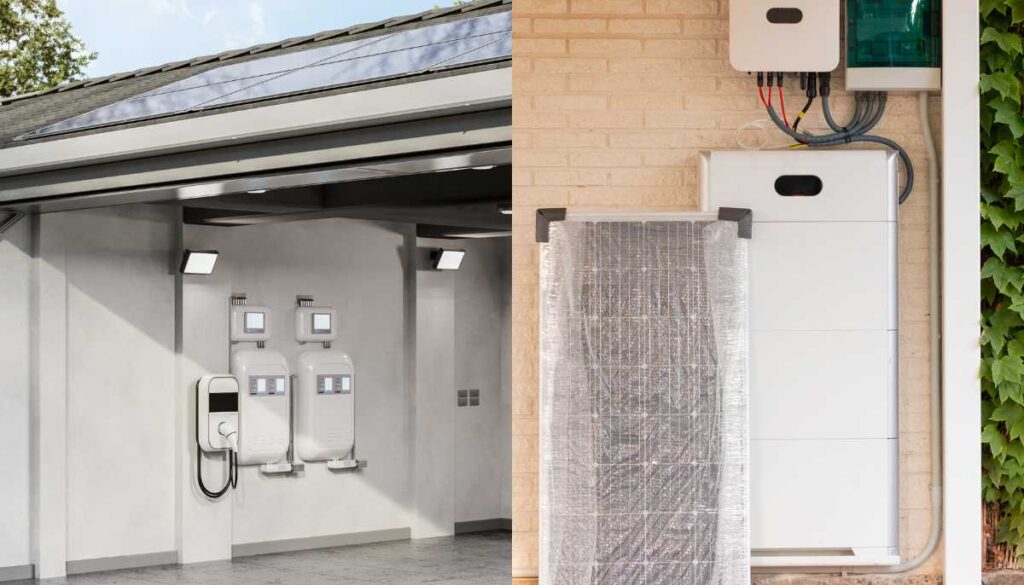Solar panels aren’t perfect. They have a big, ugly flaw. Namely: they only work when the sun is shining.
This is hardly their fault. After all, they do have ‘solar’ in the name. But it does present an obstacle to people who would really like to generate all their household electricity themselves, but who find they have to rely on the damn grid to boil an egg in winter.
One solution is a solar battery. However, before you commit to getting one (or get upsold by your solar installer) please please consider the downsides.
What are solar batteries? e.g. home battery storage.
A solar battery stores the electricity generated by your solar panels, for use at a different time of day. Many people use electricity in the evenings, and are out during the day. A solar battery helps smooth out that usage
Solar batteries are large, usually lithium-ion batteries (like a big phone battery). They are about the size of a medium radiator, and usually sit in a utility area, although some can be installed outside. They can store anything from 3kWh to 15kWh, and of course you can add multiple batteries to double or triple that.

Now I should explain: ‘solar battery’ is actually a bit of a contentious term. Really these are just ‘batteries’ or, better, ‘home battery storage’. I need to explain that for two reasons: 1) it will shed light on some value calculations later, 2) it will stop men called Colin sending me sniffy emails.
How much do solar batteries cost?
£8,100, on average, including installation. Or £1,656 per kW. That’s according to the MCS dashboard, and is the number for ‘battery storage’ across 2024, as of October.
This is how much people actually pay, usually as part of a bundle with their solar installation. However it’s perfectly possible to get cheaper battery storage by buying a battery separately and getting an electrician to install it.
You can see lots and lots of batteries here on Tradesparky. Here, I’m seeing the following prices:
- 13.5kWh Battery – roughly £4,500 excluding VAT
- 5kWh Battery – roughly £2,200 excluding VAT
- 2.4kWh Battery – roughly £1,500 excluding VAT
(Solar Batteries do not currently incur VAT, until March 2027)
These all include the price of the inverter (which you need to change AC to DC current). So you can see it’s entirely possible to lower the costs* if you find a reasonably priced installer.
*The exception, perhaps, is the Tesla Powerwall, which is very sleek and very effective, but will cost more like £6300+ excl VAT for a 13.5kWh unit at time of writing.
Is a solar battery or home battery storage worth the investment?
I don’t think it is. Not currently. Let me explain.
Most people use home battery storage in the following ways:
- To collect solar power generated during light hours, and use it in the evenings.
- To collect energy at night, when there are cheaper rates, and use during the day.
- A combination of the two.
Let’s take strategy 1. Well, the immediate problem is that it won’t work for much of the year. In the winter months you just can’t generate enough energy during the day to fill the batteries. In summer, you’ll generate too much. That’s fine – because you can sell the energy back to the grid at up to 15p per kWh, under the SEG scheme. But you don’t need a battery for that.
Now for strategy 2. This is essentially about buying energy at low rates, and saving it to use at peak times. This does work – you can fill your battery overnight on a rate like Octopus Go, which was 8.5p per kWh when I checked for our postcode. The day rate was 26.5p. So that means for every kWh you use, you’ll save 18p. The average household uses 2900kWh per year, giving a total saving of £522.
Well, that sounds good, doesn’t it?
Unfortunately here comes the downside, whether you’re using strategy 1 or strategy 2. A battery only lasts about 10 years, but it could be as little as 5 if you’re using it very heavily. That means, for the average install cost of £8,100, it’ll cost you £810 a year. Even if you go to Trade Sparky and get a 13.5kWh battery (and you will need this size, as 2900kWh a year equates to 8kWh a day) installed cheaply for £5000ish, you’ll just be spending £500 a year on the battery. As investments go, it’s not going to catch Warren Buffet’s eye.
Now… you will find lots of opinions online, including on this very informative MSE discussion. Some of these opinions contradict me. They’ll fall into the following categories:
- Using a lot more electricity makes it viable. If you have a heat pump and an EV, the numbers stack up more. True, they do. But of course you then have to invest in a heat pump and an EV, which cost upwards of £30k combined. We’ll all do it one day, but you can’t pretend it’s an instant money-spinner.
- By combining both strategies, using solar panels, selling excess energy at high SEG rates, charging up the battery overnight, you can make a profit. I don’t doubt it. But in many cases this is marginal, and to do it properly you basically end up running a power station and talking a lot about your export tariff, which means you’ll never get invited to parties. Maybe you don’t care about parties. But we are talking £100s not £1000s of profit here, over a decade. Partly because batteries, inverters, controllers and so on are not 100% efficient, and neither are their operators. It’s hard to find fully costed examples of a home battery paying back its investment in real life, and I suspect this is because not many do.
Unlike solar panels, solar batteries do not have an established payback period. Partly this is because home batteries are expensive, and partly because the SEG payments are generous, meaning you can essentially use the grid as your battery by exporting it.
When both of these things change, batteries will be much more viable.
What are the alternatives to a solar battery?
Right now you can just export solar power to the grid and get paid for it. If you’re generating solar and not using it, you can get paid through the SEG scheme, which varies by energy provider, but tops out at around 15p per kWh.
However, there are big innovations on the horizon.
The biggest of all is V2H, which stands for Vehicle-to-Home. This technology allows you to power your home from your car. In other words, your EV would become your home storage battery, charging up at night, or from your solar panels, and discharging electricity when you need it.
This is a seductive idea. Most of us will have an EV before long, so there will be no additional cost. Then there’s the size. Whereas the biggest home batteries are 13.5kWh, an EV battery can be over 6 times the size (a BMW i5, for instance, holds 83.9kWh).
Of course, there are snags with this idea. What if you don’t have a driveway? What if you don’t drive? What if one person is at home, while the other person drives their battery away to work?
All valid, if a bit negative. As with all technology, there will be a variety of solutions for different circumstances. Lots of people still get gas or oil delivered, because they’re not on the mains. Air source heat pumps won’t be for everyone.
But I like the sound of V2H, and personally I’m going to hold off buying a battery and see what happens there.



